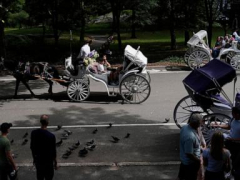NEW YORK — For more than 150 years, horse-drawn carriages have been trotting through Manhattan’s Central Park, weathering the arrival of the automobile, years of criticism from animal rights activists and even a mayoral administration that vowed to ban the tourist activity.
But now the influential nonprofit that manages the 843-acre park — and has previously stayed out of the debate — has now thrown its support behind a proposal to wind down the industry as early as next summer.
The Central Park Conservancy argued in an Aug. 12 letter to the City Council that horse carriages have an outsized impact on public safety and road infrastructure in the increasingly crowded park.
“We can’t be just frozen in time,” said Elizabeth Smith, the conservancy’s CEO, in an interview this week. “Horses are too unpredictable and the roadways are too busy with too many different kinds of users now — bikers, runners, pedestrians, strollers.”
Smith noted other cities have done away with the nostalgic rides, including San Antonio, which passed a five-year phase out of the industry last year. Chicago banned it starting in 2021 and Montreal did the same the year prior.
The carriage industry argues it’s being unfairly singled out, despite the number of horses in the park barely budging since World War II.
There are currently 68 licensed carriage owners with a total of about 200 horses and 170 drivers, according to the Transport Workers Union, which represents industry employees.
Meanwhile, Central Park sees some 40 million visitors annually, many of them increasingly zipping around on rental bikes or hitching a ride on one of the human-powered pedicabs that line the park’s entry points. Cars were banned from the park’s drives in 2018.
Eliminating carriage horses also goes against famed landscape architect Frederick Law Olmsted’s vision for the park, with its hilly paths and undulating roads tailor-made for leisurely carriage rides, argues Christina Hansen, a longtime carriage driver and industry spokesperson.
“We’re seeing the park the way it was meant to be seen,” she said as she gave a recent tour, which runs about $72 for the first 20 minutes and $29 for each additional 10 minutes.
Animal rights groups have long complained the horses can get easily spooked on city streets, leading to accidents and injuries. They also claim the horses are overworked and live in inadequate stables and their drivers flaunt city regulations, including leaving behind piles of horse manure. All animals are supposed to be fitted with manure-catching devices.
“There’s simply no way to operate horse-drawn carriages and have it be safe or humane for the hor





